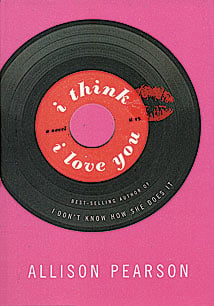 Few writers have the unerring ability to nail the nuances of modern female reality like Allison Pearson. Her breakout novel, I Don’t Know How She Does It, is a funny, poignant depiction of a stressed-out, privileged working mom. Now her second, I Think I Love You, weaves the exquisite agony of teenage infatuation with later-in-life romantic turbulence and loss.
Few writers have the unerring ability to nail the nuances of modern female reality like Allison Pearson. Her breakout novel, I Don’t Know How She Does It, is a funny, poignant depiction of a stressed-out, privileged working mom. Now her second, I Think I Love You, weaves the exquisite agony of teenage infatuation with later-in-life romantic turbulence and loss.
The book’s title, as anyone who grew up in the ’70s wearing Dr. Pepper-flavoured Bonnie Bell Lip Smacker knows, is from a hit song by David Cassidy, he of the feathered locks and Partridge Family fame. Cassidy is the obsession of protagonist Petra Williams, a gawky 13-year-old growing up in South Wales who pores over the Essential David Cassidy Magazine with friends excitedly preparing for his 1974 London concert, which will prove a life-changing event. The teens didn’t have a clue that the letters from “David” they swooned over were written by magazine staffer Bill Finn, whose own story offers cynical adult relief from Pearson’s pitch-perfect depiction of teen treacheries and longing.
Alas, the book’s second half loses vibrancy as it shifts from first to third person and fast forwards 25 years. The 38-year-old Petra is a music therapist with a 13-year-old daughter obsessed with Leonardo DiCaprio and a cello-star husband who left her for another woman. But a random discovery propels her back into the Cassidy orbit, where she meets Bill, reunites with her best friend, and finds herself in a fairy-tale ending that would have thrilled the 13-year-old Petra but will leave her adult contemporaries trying to furrow their Botoxed brows in disbelief.
Still, Pearson redeems with an afterword that reveals that she, like Petra, wore unflattering brown believing it was Cassidy’s favourite colour. Better, she provides a transcript of her 2004 Daily Telegraph interview with the singer. When he obligingly screams at her as so many “cave-girl crazy” young women did for him and then thoughtfully explains life as a “transitional love object,” cosmic equilibrium is restored for a generation of women, if only for a second.